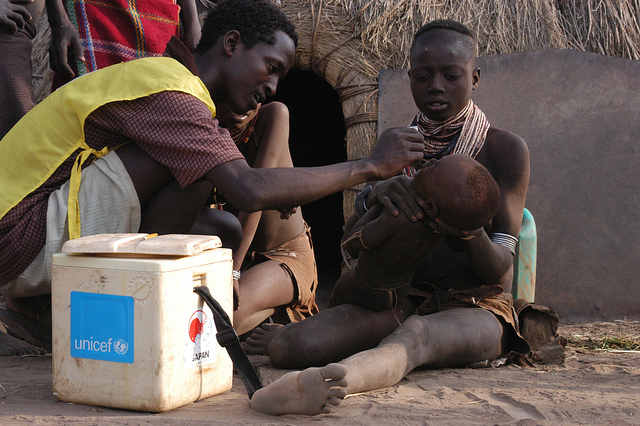News & Updates
Millions more children to be protected against disease thanks to UNICEF’s new vaccine deal
08 November 2016

Millions more children in the world’s poorest countries will receive the pentavalent vaccination, preventing the infection of five life-threatening diseases after United Nations Children’s Fund (UNICEF) negotiated a deal with six of its manufacturers to reduce the price of treatment by half.
The price drop, now less than US$1 a dose, will allow UNICEF to buy 450 million doses which will be administered in 80 countries over the next three years.
The pentavalent vaccine protects against diphtheria, tetanus, pertussis, hepatitis B, and Haemophilus influenzae type B, all of which are potentially fatal infections. The administration of the vaccine will be supported by the Gavi Alliance.
Since 2001, a strong collaboration between the Gavi Alliance Partners, which includes UNICEF, the Bill & Melinda Gates Foundation, and the World Health Organization (WHO), has achieved an affordable and sustainable pentavalent vaccine supply for the world’s poorest children.
Both donors and governments will also be able to access the new price, generating savings of up to US$366 million in development health care spending.
“Ninety percent of the world’s children under five who die from vaccine-preventable diseases live in countries whose vaccine supply is no longer fully funded by donors”, said Shanelle Hall, director of UNICEF’s supply and procurement headquarters. “For the most vulnerable children in the world, pricing can make a difference between life and death.”
Dr. Seth Berkley, CEO of Gavi, estimates that 5.7 million deaths will be prevented between 2011 and 2020 as a result of the pentavalent vaccine.
“The market for five-in-one vaccines is now a lot healthier than it was just a few years ago thanks to our collective efforts to grow a base of vaccine supplies,” said Dr. Berkley. He went on to say that Gavi remains “committed to making vaccine markets work better for the world’s poorest countries to ensure immunization investments and efforts are sustainable for all.”
Innovations and technologies to support health SDGs are one of the key topics at the 2nd annual Aid & Development Africa Summit. Taking place on 28 February-1 March 2017, over 70 expert speakers will share their insight into maternal and child health and will discuss innovations and best practice to tackle communicable diseases in sub-Saharan East Africa.
Visit http://africa.aidforum.org/agenda/ for more details.
Register your participation at: http://africa.aidforum.org/register
IMAGE SOURCE: UNICEF